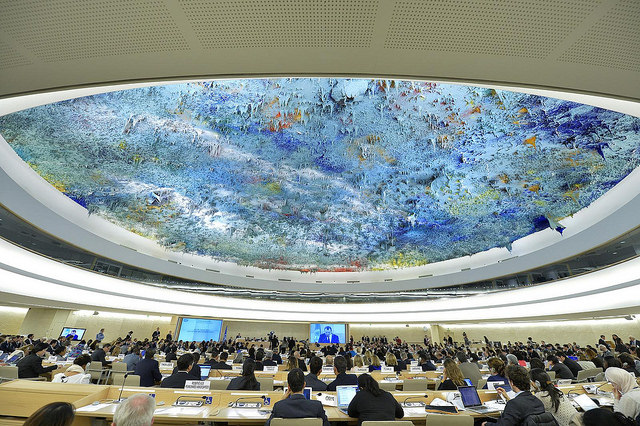
Credit: UN Photo / Jean-Marc Ferré
From March 2 to 27, the United Nations Human Rights Council is holding its 28th regular session in Geneva, Switzerland. The agenda includes high-level panel discussions, interactive dialogues with special procedures, debates on racial discrimination and on the rights of persons with disabilities, and the consideration of Universal Periodic Review (UPR) outcomes. The United Nations Office of the High Commissioner for Human Rights (OHCHR) has presented its report, which was published jointly with the United Nations Assistance Mission for Iraq (UNAMI) on the human rights abuses committed by the Islamic State and other terrorist groups, as requested by the Council in September. In his opening address, the High Commissioner for Human Rights called on States to renew their commitment to fundamental rights and to refrain from selectively complying with their international obligations. For more information on the Council’s resolution requesting the OHCHR to investigate the Islamic State, see IJRC’s previous news post.
March 2 through 6
The United Nations High Commissioner for Human Rights, Zeid Ra’ad Al Hussein, opened the session by presenting his annual report, which covers the OHCHR’s activities in 2014. He also took the opportunity to call on States to recommit to respecting human rights and to cooperate fully with the Human Rights Council’s human rights mechanisms.
The session’s first week will include multiple high-level panels and full-day discussions on human rights mainstreaming, the death penalty, and the impact of climate change on human rights. [OHCHR Press Release]
March 9 through 13
The second week will feature interactive dialogues with thematic special procedures, including the Independent Expert on human rights and the environment, Independent Expert on foreign debt, and Special Rapporteurs on: adequate housing; torture and other cruel, inhuman or degrading treatment or punishment; the situation of human rights defenders; the freedom of religion or belief; the promotion and protection of human rights and fundamental freedoms while countering terrorism; the human rights of persons with disabilities; cultural rights; and the sale of children, child prostitution and child pornography. The Special Representatives of the UN Secretary General on violence against children and on children and armed conflict will also be heard from before a full-day meeting on the rights of the child. [OHCHR Press Release]
March 16 through 20
During the third week, the Council will engage in interactive dialogue with the Special Rapporteur on minority issues, and with special procedures that hold mandates in specific countries, including the Commission of Inquiry on Human Rights in Eritrea and the Special Rapporteurs on situation of human rights in: the Democratic People’s Republic of Korea, Islamic Republic of Iran, and Myanmar. The Independent International Commission of Inquiry on the Syrian Arab Republic will present its report on human rights abuses in Syria, which stresses the “urgent need for concerted and sustained international action to find a political solution to the conflict, to stop grave violations of human rights and to break the intractable cycle of impunity.” See Human Rights Council, Report of the Independent International Commission of Inquiry on the Syrian Arab Republic, UN Doc. A/HRC/28/69, 5 February 2015.
The Council will hold a panel discussion on national policies and human rights, and a debate on racial discrimination. The Council will consider the UPR outcomes for the following States: Italy, El Salvador, Gambia, Bolivia, Fiji, San Marino, Kazakhstan, Angola, Iran, Iraq, Madagascar, Slovenia, Egypt, and Bosnia and Herzegovina. [OHCHR Press Release]
March 23 through 27
The fourth and final week of the session will begin with a presentation by the UN Independent Commission of Inquiry on the 2014 Gaza Conflict and the Special Rapporteur on the situation of human rights in the Palestinian territories occupied since 1967. The Council will hold a discussion on technical cooperation, and then the OHCHR will present the report that it published jointly with the UNAMI on human rights abuses in Iraq committed by the Islamic State and other terrorist groups. See OHCHR & UNAMI, Report on the Protection of Civilians in Armed Conflict in Iraq: 11 September – 10 December 2014 (2015).
The Council will hold general debates on: the human rights situation in Palestine and other occupied Arab territories; implementation of the Vienna Declaration and Programme of Action; racism, racial discrimination, xenophobia and related forms of intolerance; and the implementation of the Durban Declaration and Programme of Action. The Council will also engage with the Independent Experts on the situation of human rights in: Central African Republic, Côte d’Ivoire, Haiti, and Mali. Reports on human rights situations in Afghanistan, Bolivia, Colombia, Cyprus, Guatemala, Guinea, Iran, Libya, and South Sudan will also be presented. [OHCHR Press Release]
To conclude the session, the Council will address draft resolutions and decisions that were previously tabled, and the Council’s President will appoint new expert mandate holders to fill vacancies among the special procedures, including the Expert Mechanism on the rights of indigenous peoples (EMRIP), Special Rapporteur on the negative impact of unilateral coercive measures on the enjoyment of human rights, and the Special Rapporteur on the situation of human rights in Cambodia. [OHCHR Press Release]
Additional Information
To learn more about the UN Human Rights Council and the Universal Periodic Review process, visit IJRC’s Online Resource Hub.
